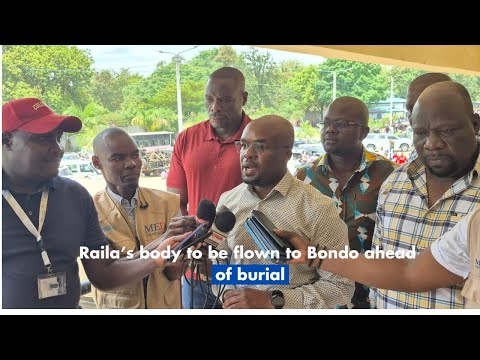Many readers perhaps quickly flipped over an article by journalist Eugene Okumu in the Star edition of January 16, 2015, totally ignorant of its monumental significance to the country’s democratic struggle. It had a screaming sub-header, 'Luo Nyanza most intolerant region in Kenya – Duale'.
The Garissa Township MP and then-Majority leader in the National Assembly was lamenting the culture of politically sponsored heckling of perceived adversaries that was prevalent at funerals or functions held in Luo Nyanza at the time. He lamented that “Luo Nyanza region is the most intolerant to divergent political views in the country.” He was further quoted as saying, “the region shows unwillingness to accommodate others even when political divides are bridged by natural events”.
Sadly, one cannot help but agree with these unfortunate sentiments. Luo Nyanza has had a negative reputation as the most intolerant to divergent political views. Indeed, this has been evidenced by incidents of political thuggery, intimidation and hooliganism making Luo Nyanza's politics atrociously violent. This is a drawback to democratic gains, stifling free speech and the political rights of those with opposing views.
Compared to other regions, Luo Nyanza has consistently been antagonistic, hostile and ruthless to political formations perceived to be opposed to the mainstream political Ark of the previously dominant Kenya People’s Union and Ford Kenya of Jaramogi Oginga; the National Development Party, Liberal Democratic Party and Orange Democratic Party, all led by Raila Odinga at different times.
Its roots go back to the onset of opposition politics in the 1960s when Vice President Oginga Odinga resigned from the Kanu government of Mzee Jomo Kenyatta and formed Kenya People’s Union party. Kanu adherents in Nyanza, and particularly central Nyanza, were ostracised and brutalised wholesale.
That however is not to deny or downplay state-sponsored terror that was meted out against opposition supporters at the time. The Founding Fathers, therefore, failed to consolidate democratic gains by entrenching nationalism, particularly for those who held the reins of power. At the advent of multiparty democracy, other regions were comparatively comfortable identifying with and even splitting their votes evenly across several political parties.
In Western Kenya there was Kanu, Ford-K and Ford Asili; In Kisii there was George Anyona’s Kenya Social Congress and Kanu; In Central there was Mwai Kibaki’s Democratic Party and Ford-A of Kenneth Matiba. In Luo Nyanza it’s been a consistent one Ark political voting machine only recently interrupted by a growing political consciousness on nil political dividends, perceived inter-regional South-Central Nyanza developmental disparity and a series of mismanaged political party nominations.
This silent revolution by the voiceless minority led to some winds of political change when candidates of fringe parties actually beat the dominant party candidates, not just at civic seats but legislative as well as gubernatorial seats.
The celebrated Second Liberation heroes, whose bitter struggles dismantled the Kanu state, failed to learn from the mistakes of the Founding Fathers and committed the same original sin of ethnically based political mobilisation. As at 2021, almost 58 years after Independence, it is becoming clear that the ideals that drove our quest for freedom have not been met, but they have also been brutally betrayed if Onyango or Atieno cannot stand and vie for political office as an independent or alternative party in Luo Nyanza without the risk of violence, intimidation and prejudice.
The infamous six-piece voting mantra that was fervently advocated by the dominant party adherents is the most hypocritical democratic grandstanding that has not only set Luo Nyanza on a backwards developmental march but also denied it very capable leaders.
There is need for regional political tolerance – the willingness to extend basic constitutional rights, the right to speak, to publish, to run for office – to opposing groups and ideas. We must retrace our steps and endeavour to build a truly open and democratic society built on the concept of political tolerance especially in Luo Nyanza.
Even if we do not agree with individuals who do not share our political beliefs or endorse our political objectives, we are expected to put up with them and tolerate their right to free speech, to assembly, and to advocate their political objectives.
Democracy is a system by which the majority have their way, while the minorities have their say. So the minority must be given the means of contestation—the right to try to convince others of the rightness of their positions.
The 2022 election in the context of envisaged constitutional amendments under the Building Bridges Initiative does portend a potent catalyst for cutthroat political competition. If intolerance is left to take root, the result would tragically be political witch-hunt of antagonists resulting in loss of life and property perpetrated by those opposed to the inevitable and imminent inter-generational political transition both in national and local politics.
With this reality, the moment calls for speedy, targeted and drastic interventions towards instilling a culture of mutual dialogue, competitive politics and dynamic re-engagement. Such a noble task can only be spearheaded by fearless patriots and change agents committed to the consolidation of democracy. It is anathema for a community to be held captive to a gangster system of patron-client politics.
As change agents we must promote a culture of mutual respect, liberalism and spearhead programmes and activities towards attaining a strategic-mind reset of critical stakeholder groups such as the youth, women and interest groups. It calls for an overhaul of the culture and political outlook amongst the Luo political elite.
A unity of purpose, self-retrospect and a redefinition of common interests are essential if emerging Luo progressives and liberals will claim victory in the fight and struggle to truly democratise the Luo Nation political environment.
Advocate of the High Court as well as a policy and governance expert











